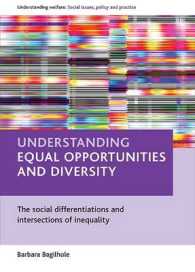- ホーム
- > 洋書
- > 英文書
- > Philosophy
Full Description
Starting from the hypothesis that all human forms of life have a political dimension - be it clearly expressed or hidden, conscious or unconscious - this volume examines the ways in which political life can be fruitfully analyzed with the help of phenomenological methodologies. Examining issues of power dynamics as they relate to pervasive epistemic and axiological commitments as well as deeply seated socio-cultural and institutional practices, this text opens and develops, through a radical critical lens and a commitment to the emancipatory potential of theoretical work, innovative paths for phenomenological investigations of the complex political aspects of our shared lived experiences. These investigations, both focused on the content matter at hand and on their own methodology, draw on phenomenological resources as well as resources from other philosophical traditions and fields, such as critical theory, feminist philosophy, and queer theory.
While various theories in political philosophy nurture an open suspicion about subject-oriented philosophical approaches (c.f., Adorno, Althusser, for example), this volume questions the status of the subject of political experience in order to explore multiple forms of political subjectivation. These guiding questions allow an investigation into a new field of research where phenomenological methodologies can help negotiate the political challenges of our time. This book appeals to students and researchers working in phenomenology and related disciplines.
Contents
1. Andreea Smaranda Aldea & Délia Popa, Possibilities of Political Phenomenology - A Critical Introduction.- 2. Ian Angus, The Primal Institution of Political Enlightenment: A Strange but Necessary Rhetoric in Philosophy.- 3. Andreea Smaranda Aldea, Realizability, Radical Reflection, and the Critical Performativity of Phenomenological Work.- 4. Maren Wehrle, 'There is f(r)iction in the space between' - On the difference between social and intersubjective normality.- 5. Lanei Rodemeyer, Alien-within-the-Home: Phenomenological Analyses of Husserl's Homeworld and Alienworld.- 6. Neal DeRoo, The Case for a Phenomenological Politics.- 7. Délia Popa, Between Self-Identification and Self-Objectivation: Alienation, Reification, and Reactivation.- 8. Jean- François Perrier, Phenomenological Savage and Social Division(s) in Marc Richir's.- Phenomenology 9. Mariana Larison, From Constitution to Institution: Reflections on the Legal and Political Scope of Phenomenology.- 10. Thomas Bedorf, Affirming a 'We' Impossible to Affirm.- 11. Ricardo Mendoza-Canales, The Phenomenalization of Power: Between Presence and Concealment.- 12. Rajiv Kaushik, How to Understand the Politics of Institution in Merleau-Ponty? A Suggestion with Reference to the Symbolic, Power, and Violence.- 13. Bryan Smyth, Critical Phenomenology, Embodied Historical Agency, and the Mythopoetic Dereification of Nature.- 14. Paula Lorelle, Social Subjectivity in Beauvoir: Elements for a Phenomenology of Domination.- 15. Lisa Guenther, Unsettling Perception: A Critical Phenomenology of Settler Colonial Body Schemas.- 16. Mérédith Laferté-Coutu, A Generative Phenomenology of Settler Homeworlds in Canada and the United States.- 17. Chad Kidd & Robin Muller, Making History: Sedimentation, Petrification, and the
"Elevation of Humanity" in Husserl and Fanon.- 18. Michael Monahan, Racialization and Whiteness: White Noise and Concrete Reciprocity.- 19. Igantio Quepons Ramírez, A negative path toward justice: A phenomenological reconstruction of Luis Villoro's disruptive Ethics.- 20. Iaan Reynolds, Reification, labor, and dialectic: Adorno's social critique of phenomenology.








